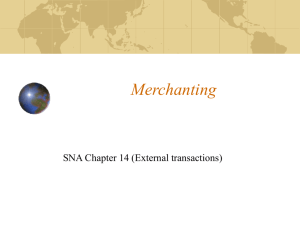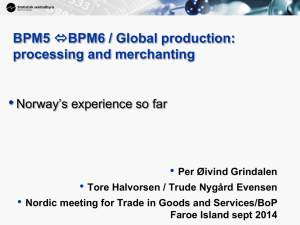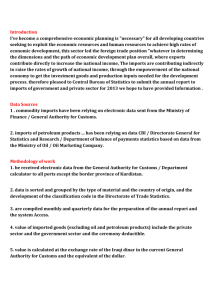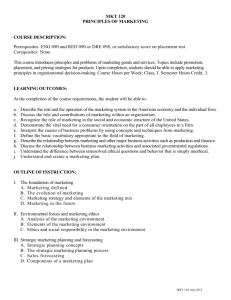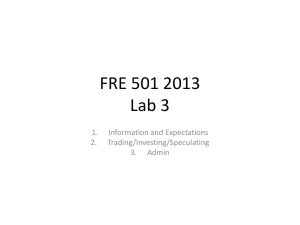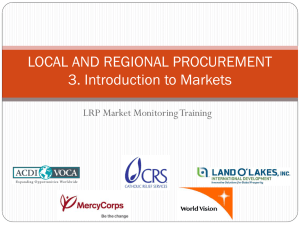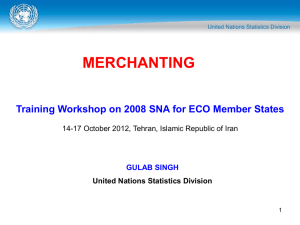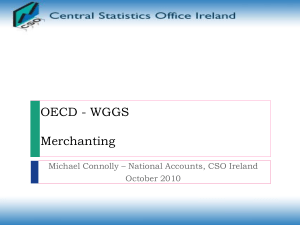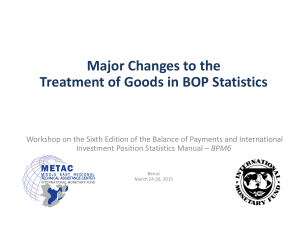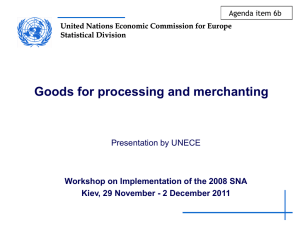Merchanting and other trade
advertisement
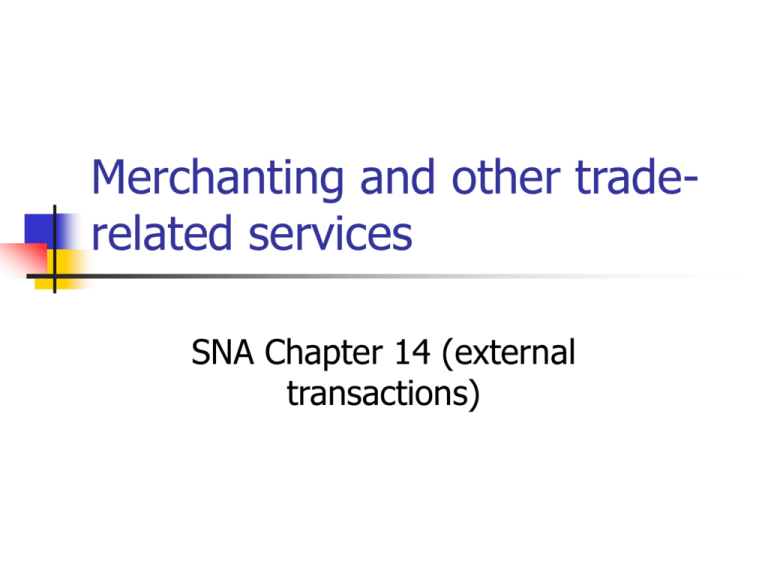
Merchanting and other traderelated services SNA Chapter 14 (external transactions) Merchanting - definition Purchase of a good by a resident (of the compiling economy) from a non-resident and the subsequent resale of the good to another non-resident (without the good entering or leaving the merchant’s economy) The difference between the value of goods when acquired and value when sold is recorded as value of merchanting services provided Merchanting- recording A sells goods to C (value 80) B sells services to C (value 20) C imports goods from A value (100) Global mismatch on goods by value No imports of merchanting ever recorded Inconsistent with normal wholesale and retail margins The classification of the transaction varies according to whether the goods pass through the merchant’s economy or not. Merchanting –recording cont Problem of timing, merchants buys in period 1, sells in period 2 Imports into compiling country in period 1 (not physically entering) Negative imports from compiling country in period 2 Brokerage Wholesale trading on behalf of others on a fee or commission basis treated as other trade related services (included with merchanting in standard heading) Why change? The key points are: The existing methodology does not apply the change of ownership to these transactions. Merchanting as presently defined captures more than one type of activity. Problems with holding gains and losses – should not be included in services This issue was discussed at the July AEG and since then further consultation has taken place. What exactly is included? Global manufacturing Global wholesaling/retailing Such activities aim to make profits from production of goods and the international transactions of goods take place as a process of such production activities. Such activities aim to obtain margin (or fee, commission) from buying and selling goods. Commodity dealing Such activities aim to obtain profits from trading and, particularly risk taking, in commodities Global manufacturing Treat as trade in goods Record on change of ownership basis, avoids exceptional treatment Consistency with goods for processing Like GFP need to track values of physical movements of goods (merchandise trade) as well as imports of goods on BOP basis Avoids negative imports Global wholesaling and retailing Treat as goods unless done on a fee basis when services (brokerage) Treat on a change of ownership basis Still need to distinguish physical movement and BOP consequences Avoids negative imports Data collection issues There may be some data collection and reconciliation problems with treating merchanting on gross basis E.g. risk of double counting trade from customs and that collected by other means such as business surveys Risk of increased bilateral asymmetries in practice And analytical consequences Alternative Keep to status quo; treat only on a net basis as a service Treats all cross country sourcing as brokerage Commodity dealing Either hedging or speculation Mostly done via derivatives (futures and option) so in the financial account Commodity markets concerned with price setting and risk trading For LME perhaps 95% of transactions settled in cash based on contract price Transactions in commodities should be at market price on change of ownership basis Questions for the AEGGlobal manufacturing Should transactions in goods resulting from global manufacturing be recorded as trade in goods (under a separate heading) rather than services (as now)? In other words, should such transactions be recorded on a gross basis, following the change in ownership principle, as for goods for processing? Global wholesaling and retailing Should global wholesaling/retailing when trading in goods be recorded as trade in goods (under a separate heading) or trade in services (as now)? If it is to be recorded as trade in goods, should this be gross basis when there is a change in ownership? Or should it be recorded on a net basis as services (as now)? Commodity dealing Make clear most commodity dealing transactions are transactions in financial derivatives? When accounts are settled in commodities, that is there is an actual flow of goods, should these transactions be recorded on a change of ownership basis, gross in goods (under a separate heading), or a net basis as services (as now)?
